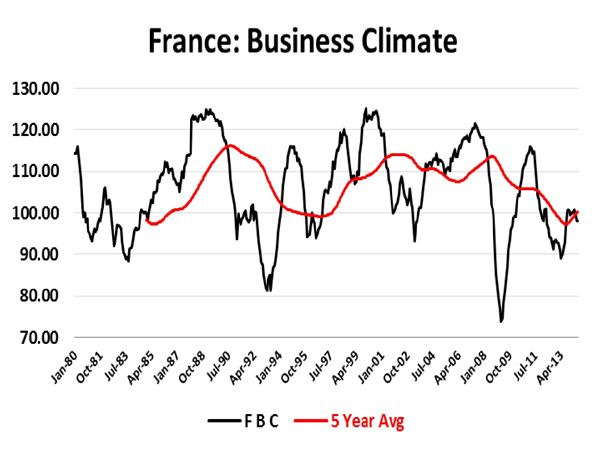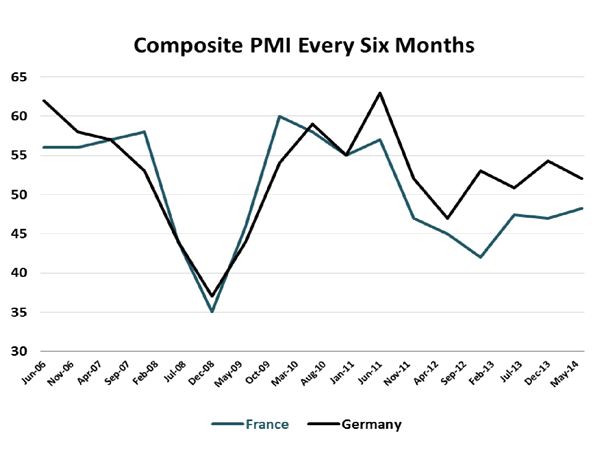The sentiment of business leaders in France is that economic growth will be weak. In fact, it will be too tepid to deliver any cut in the unemployment rate, which has been stuck above 10 percent for the past six quarters. Given this, it is hardly surprising that President Francois Hollande’s popularity is terribly low, at 16 percent. What is a shock is the fact that this compares to an approval rating of 33 percent for his predecessor, Nicolas Sarkozy, who has been under investigation for allegedly using judicial contacts to keep a watch on a pending investigation of his 2012 campaign finances.
At the heart of the economic condition is the rate of national unemployment. This is seen as rising to 10.2 percent in Q2 this year, and risks drawing level with the record high of 10.3 percent that was booked in Q1, Q2 and Q3 last year.
In its first forecast for the whole of 2014, INSEE said the Eurozone's second-largest economy will grow by just 0.7 percent this year. This is significantly below the 1.0 percent that the Hollande administration has suggested and upon which it has based its economic and financial strategy.
Business leaders remain unimpressed by the current administration even despite attempts by the president to kick-start the economy through pledges of tax cuts for business and tax breaks for low-income households, in a bid to improve their spending power.
Despite the rhetoric from the president and his leading ministers, the measure for the business climate is below the 5-year average.
 Source: INSEE
Source: INSEE
In France, the complaint is that the message from the Hollande administration is unclear, and often explanations vary from one minister to another. The result is that businesses and entrepreneurs have difficulty interpreting whether the current policy is actually freeing or fettering their strategic plans.
The French economy has been trapped inside an envelope of low growth as businesses have cut their investment and household spending has fluctuated between contraction and expansion. Employers say they cannot hire more workers until they can see more business in the pipeline and they are sure any pick-up in orders will have staying power. This lack of confidence has led to a gap of the nation’s Manufacturing PMI compared to that of Germany.
 Source: Markit
Since 2004 HEC Paris, which specialises in education and research in management sciences, has been assessing the morale of French executives. The decade of 2004-2014 has been marked by a deterioration in the optimism of business executives on a range of issues such as the economy, employment, quality of living and career progression.
The later point is curious as French workers seem to be more critical of management than is the case in Germany or the UK. Most chief executive officers of leading firms were all educated at a handful of grandes écoles. This is far more the case than in the UK, for example.
Source: Markit
Since 2004 HEC Paris, which specialises in education and research in management sciences, has been assessing the morale of French executives. The decade of 2004-2014 has been marked by a deterioration in the optimism of business executives on a range of issues such as the economy, employment, quality of living and career progression.
The later point is curious as French workers seem to be more critical of management than is the case in Germany or the UK. Most chief executive officers of leading firms were all educated at a handful of grandes écoles. This is far more the case than in the UK, for example.
Given that France has kept its low yields throughout the Eurozone crisis is simply a case of other nations being in such poor shape that France could stay out of the spotlight. The question of whether or not it can retain the low yield and spread structure going forward will depend on how much political will there is to get the French economy back on an efficient and effective track, and make it competitive again on a global scale.
Looking to the historical context one has to say that the political will to deliver change has been conspicuous by its absence. One can make a convincing case to suggest that the French elite has believed that the blessed mix of “State, Unions and Employers” or "les partenaires sociaux” that led to the golden post-war period of “Les Trente Glorieuses”, i.e. 30 years of uninterrupted economic growth was intact and would always see France through any economic maelstrom.
Even now a hallmark of France is the total embrace of “Fermeture Annuelle” or the “Annual Shutdown” in August which means missing out on industrial production and tourist expenditure. Such national idiosyncrasies may be picture-postcard charming, but have little role to play in the homogenised world of globalisation.
The President has not made much headway on delivering his much promised reform and his administration still seems to fail to grasp that last wealth and job creation flows from free enterprise, not the statist centre.
In a globalised world, talk is very cheap and this delay in introducing wide-ranging business friendly policies and a negative attitude toward free enterprise is damaging for French industry. Kill off new business and one kills of any chance of a lasting, revitalised economy.
Big business will run the gauntlet of the government because corporations that are mostly owned by the private sector in France and overseas recognise that their responsibility is to their shareholders…not "here today, gone tomorrow" government policies.
We think it is too difficult for the French socialists to become genuinely centre-ground free market advocates, and the raw ambition of their policy will only serve to accelerate the export of jobs and manufacturing capacity to low-wage countries. It is not only taxes that will harm business and employment in France.
The unions wield considerable power and successive French governments have yielded to their demands to buy stability and popularity, particularly when the election clock is ticking. The result is a system whereby employees in France enjoy a high level of job protection and guaranteed salary levels. It is not ideal but a socialist utopia is a fantasy that has failed time and time again; salaries cannot be guaranteed, nothing lasts forever.
We sense that big business will revolt and defy the government by being proactive in offshoring, and smaller business entrepreneurs will start up… but not in France. That may actually serve the bottom line of CAC 40 corporations better in the long run. We foresee a major economic curiosity in that the domestic economy may flounder but the main French equity index will rise.
